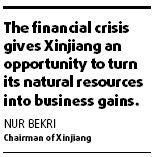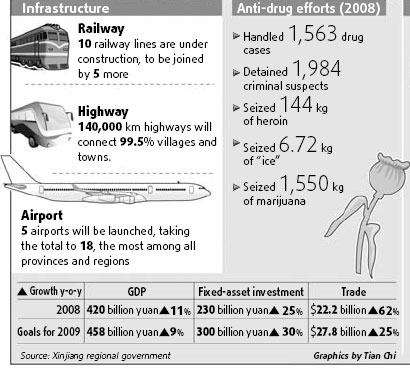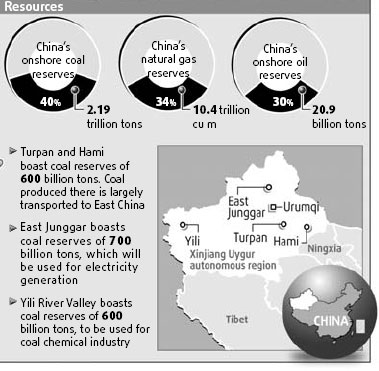|
|

Graduates at a job fair in Yining, Xinjiang Uygur autonomous region. File photo |
Xinjiang will boost efforts to improve its infrastructure this year in a move that could see the autonomous region spend 300 billion yuan ($44 billion) - 30 percent more than last year - on its fixed assets, an official said yesterday.
"The financial crisis gives Xinjiang an opportunity to turn its natural resources into business gains," Nur Bekri, chairman of the Xinjiang Uygur autonomous region, told China Daily.
The investment will be made in transport, aviation and water projects.
While 10 railway lines are already under construction, work on five more will begin this year, Bekri said. One of the five new routes will link Lanzhou, capital of Gansu province, to Urumqi, the capital of Xinjiang. The line, which will see trains zip through at a speed of more than 300 km per hour, will link another fast line from East China, drastically reducing the travel time between Beijing and Urumqi from 36 hours to 12 hours.

The region will add new roads to increase its highways to more than 140,000 km by the end of this year. This will mean that 99.5 percent of the region's villages and towns will be accessible by highways, compared to 97 percent last year.
Xinjiang also plans to build five more airports this year, bringing the total to 18 - making it the region with the maximum number of airports in China, Bekri said. "We can expect more airports to boost local tourism," he said.
Four mega water projects to be rolled out this year will include dams, water diversion projects, irrigation projects, underground water and safe drinking water projects, Bekri said.
The resource-rich region will also rev up efforts to tap its reserves with coal mining projects to take off in Turpan and Hami. A coal power project in East Junggar and a coal chemical project in Yili River Valley are also on the agenda.
Bekri said the huge spendings in infrastructure and resources this year will push up the fixed-asset investment by 30 percent. Last year, the fixed-asset investment in Xinjiang increased by 25 percent to 230 billion yuan.
Bekri said the region's infrastructure growth would not be at the cost of the environment and that projects would not be approved if they fail environment and ecological impact assessments.
He said that the geological structure of the underground water basin is such that there is no effective method to restore the water quality if it is polluted.
"Some people, including local officials, wrongly feel that pollution does not cause harm because of Xinjiang's vast land area, which is one sixth of China's," he said. "The environment in Xinjiang is more fragile than we expect."

 |



